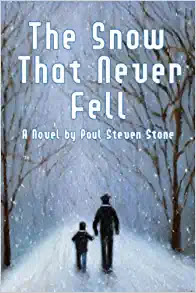“The
Snow That Never Fell” by Paul Steven Stone, Alien Buddha Press, 2023
Review
by Lee Varon
“The
Snow That Never Fell” is a book I could not put down and one of the only novels
told from the viewpoint of a single divorced father. In fact, when I googled
novels by single dads, what came up were either non-fiction self-help/how-to
books, or single dad romance books!
“The
Snow That Never Fell,” dramatically brings to life the world of Paul Peterson,
a single divorced father of three children—two pre-teen daughters and a
nine-year-old son, Mickey. The book is insightful, poignant, and often humorous.
In
the opening scene, we find ourselves immersed in the excitement and tumult of the
annual Pinewood Derby where over 200 nine and ten-year-old cub scouts and their
fathers gather in a church basement with their hand-crafted model racecars for
a racing competition.
Looking
around the chaotic scene, Paul muses: “How many times have I been startled by
the fact that I do not understand the world my children inhabit?” And yet
throughout the book we see Paul doing his best to understand the world of his
children, particularly his son Mickey, who often reminds him of himself as a
child. Determined not to parent like his charismatic, yet self-involved, brash,
and distant father, who left him with a lonely ache for connection, Paul does
his best to meet the challenges of single parenting.
There
are no instructions that come with the box each cub scout is given. There is
only a block of wood, two axels and four black tires. The lack of instructions,
serves as a metaphor for the lack of instructions that come with Paul’s new
life as a single divorced father.
“A
small, elongated block of wood that someone foolishly painted fuchsia,” is how
Paul describes their finished racecar. It was, in fact, Paul who suggested the
color, thinking it was similar to a car he once owned. But the result is more
pinkish than he envisioned and the color engenders a host of snide remarks from
some of the other cub scouts.
Apart
from the color, initially, Paul blames his ex-wife for the fact that he and his
young son don’t have a better racecar. The divorce which his wife (Marilyn)
initiated was contentious, expensive and, as Paul states: “Marilyn decided to
break up our family, and Marilyn decided to hire a divorce attorney who did her
legal best to hang my balls on a plaque and reduce me to poverty.” In the
divorce settlement, his ex-wife had gotten the house and all of Paul’s
tools stored in the house—tools he could have used to make a better looking
racecar! While admitting his own tendency to procrastinate had something to do
with the final outcome of the racecar, he still can’t give up the idea that the
car’s poorly conceived and executed creation was the fault of his ex-wife.
Anyone who has been through the breakup of relationship can relate to Paul’s
statement: “It is strange how we can free ourself from someone and yet remain
captive to her at the same time.”
Obviously,
Paul harbors some bitterness, but this is not the way the story ends. Over the
course of the book, Paul, deepens his understanding of himself and his
children. Paul Peterson is not a static character—as in any compelling
narrative, he changes and his readers accompany him on his journey.
Although
the story revolves around the pinewood derby, our narrator brings us along on a
far-reaching saga which includes a mild flirtation with a single mother at the
Derby, a contentious run-in with another father—a bombastic blockhead,
reminiscent of Paul’s clueless father—nostalgic musings on Paul’s family life
prior to his divorce, and contentious sessions with his avuncular therapist.
No
spoiler alerts here, but there are plenty of unexpected twists and turns in the
story line. Through them all, Paul perseveres and comes to a deeper
understanding of his own suffering as well as some of the difficult times his son
Mickey encounters.
For
Paul, there is a greater acceptance that—for both himself and his children—you
don’t always get a choice about things. And that his suffering has, in fact,
helped to make him a better person and a better father. In fact, to become an
enormously empathic and caring father.
Paul does not simply succumb to the trauma he has experienced; in the
course of the book, he evolves and matures. “The challenge is not to avoid
suffering,” he tells us, “but to make the most of it while you can,” Our
narrator certainly makes the most of his challenges, and we, as readers, are
the beneficiaries as we accompany him on his journey. You will not be the same
after reading “The Snow That Never Fell.” It will deepen and sharpen your
understanding of the human condition.
A
condition in which none of us is ever given an instruction manual.

Excellent review- I read this book too, and the review is spot-on.
ReplyDeleteWell done review. Sound like a great book.
ReplyDelete